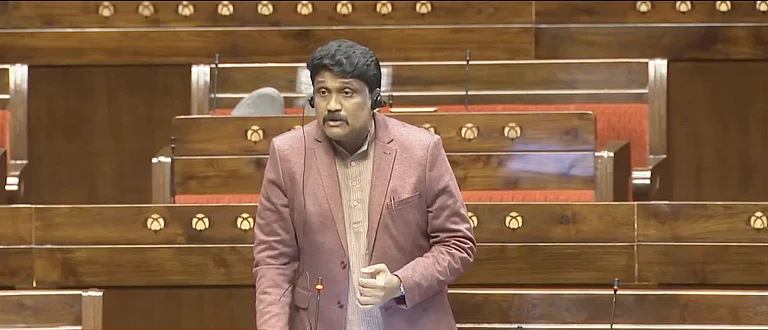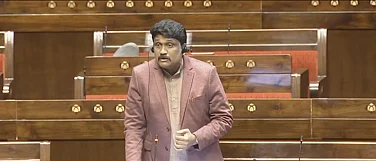The crisis in the BJP’s Gujarat unit might have passed off as yet another routine irritant in the RSS’s 71st year of existence, marked as it is by many ups and downs. But it brought upfront the growing intolerance—if not active hostility—of the BJP, its political offshoot, towards RSS representatives in the party.
Officially, RSS philosophy and guidance might enjoy the same sanctity as before. But as the events unfolded in Gujarat, they indicated a trend away from that cosy, parent-child bond. This display of adolescent petulance on the BJP’s part has coincided with the party’s fast growth—in both size and ambition. For one, the BJP membership has crossed the one crore mark, a quantum leap from the pre-Ayodhya days and almost over thrice the estimated number of RSS volunteers.
All this is causing anxiety in the RSS camp. "The Sangh has taken note of it and its leaders will come out with some formula to re-establish the traditional bond," a senior RSS leader says.
The Sangh’s gradual drift towards an ineffectual paternal role is the natural corollary of a process that began long ago with the equations quite the opposite of what they are today. The RSS, in the first flush of its ideological life, had a near-blanket ban on its volunteers dabbling in politics. It finally relented in 1951 when S.P. Mukherjee founded the Jana Sangh. As a compromise, RSS full-timers (pracharaks) were loaned to the Jana Sangh, mainly to act as organisational functionaries. Ever since, the political wing has maintained an umbilical relationship with the RSS—the latter was the guide and the ideologue and the Jana Sangh, a follower and practitioner, determined to realise the RSS- world view politically. Is the agent outgrowing the master? The suggestion provokes instant disclaimers from the Sangh. "The RSS’s objective—a total change in the system and awakening of the people—cannot be a time-bound goal. The change has to come from the society, the people and through the government—be that of the Congress, the BJP or any other party," says K.C. Sudershan, RSS joint general secretary.
He also rejects the popular perception of the BJP as its political offshoot. "All we expect from a BJP government is that it contributes to the social change the Sangh is aiming at. The question of growing differences does not, therefore, arise."
There are about 150 RSS pracharaks in the BJP party set-up—around 100 of them on a more or less permanent basis. Despite the erosion in the old ties, there are indications that the current BJP leadership still values their presence. For instance, discredited Gujarat leader Narendra Modi, who is closely identified with the Sangh, is likely to be accommodated in Delhi. Coming after the party high command’s decision to "sacrifice" him to mollify dissidents in the state, the gesture is significant.
"The RSS, no doubt, is the BJP’s soul," concedes Mukul Shah, a dissident leader from Ahmedabad. "But it should not openly get into power politics through its representatives." In the past, incidents of much bigger dimensions would, typically, get a quiet burial. Veteran labour leader Dattopant Thengari, for example, returned to the Sangh fold after Atal Behari Vajpayee vetoed a second Rajya Sabha term for him in the early ’70s. The Sangh drafted Thengari back to the Bharatiya Mazdoor Sangh, which he had single-handedly developed.
Thengari’s departure was effected without much acrimony and the Sangh did not make it a prestige issue as it recognised the broader autonomy its family members enjoyed in their respective areas. It continued to operate as a benevolent patron to the BJP and others, often as a watchdog advising against compromises on policy matters. But relations have soured since. On the contrary, the Modi episode has caused much heartburn and uneasiness.
The differences do not centre solely on individuals, but policy issues too are throwing up enough divergent responses. The RSS spoke out unequivocally against P.V. Narasimha Rao’s liberalisation drive as soon as it was launched in 1991; the BJP was simultaneously accusing the Congress of stealing its economic policy.
The Sangh had the anti-globalisation Swadeshi Jagaran Manch floated (with Thengari as its guiding spirit, low-profile in typical RSS style). While it initially got the BJP-Shiv Sena Government in Maharashtra to scrap the Enron deal as recommended by the Manch, the coalition regime began quiet renegotiations with Enron in defiance of the Sangh. "After all, a government has to show some kind of continuity and respect for national policy," says a senior BJP leader from Maharashtra.
In fact, similar potentially divisive problems abound (see graphic). But of late, even the Sangh seems more driven by the immediate quest to have a government "to protect Hindu interests" installed at the Centre. The compromise on issues like supporting the Mayawati regime, the unchecked enrolment of members, and distribution of party tickets to outsiders for elections have received the Sangh’s endorsement as part of this design. And erosion of loyalty was only natural—for most new entrants, the BJP is a short-cut to power and the RSS does not exist.
In fact, the BJP party constitution itself allows less latitude to the RSS than was the case with the Jana Sangh. Then, an organ-ising secretary—who was supreme in the organisation—was almost essentially an RSS pracharak. When the BJP was formed in April 1980, the post of organisational secretary was scrapped.
The move for total dissociation from the Sangh during the 1980-85 period—when Vajpayee as its head tried to nudge the BJP into a Gandhian socialist-secular mould—was reversed in 1986 when L.K. Advani took over. An overwhelming majority of party-men rejected Vajpayee’s formula but the RSS itself did not show much keenness in reverting to the Jana Sangh pattern.
"After all, the BJP also operates in the same society and cannot be free of the rot,’’ says Sudershan, justifying alliances with diverse parties. And so, the contradictions became more visible in a string of episodes. Some 35 non-RSS BJP MLAs participated in last month’s rebellion against Keshubhai Patel. A young pracharak, who commands enormous respect in the Sangh, was accused of watching blue films in the RSS office by a two-term Lok Sabha MP from Gujarat (an inquiry found the charge baseless). Party General Secretary K.N. Govindacharya was hounded out and kept out for over a year-and-half by then BJP chief M.M. Joshi in 1992. There is increasing tension between the state leadership and RSS representatives Pawan Sharma (Delhi) and Omji Mathur (Rajasthan)—states where the BJP is in power—mainly on the issue of the government’s style of functioning. "We at times feel the RSS should review the entire arrangement of lending pracharaks to the BJP," says a senior pracharak.
But a tangible dilution in the quality, commitment and ability of pracharaks have contributed to the erosion in the respect they command from the BJP. In fact, Sangh chief Rajendra Singh took serious note of this last year in the wake of reports that pracharaks, especially those in the BJP, had shed their customary austerity and were beginning to enjoy a lavish lifestyle.
Coupled with this was tactical myopia. During the 1986-92 phase, the BJP surrendered its political character to the VHP on the issue it had pioneered—Ayodhya. In the end, the BJP played second fiddle throughout, a tacit acknowledgement of VHP supremacy in identifying political issues for it. It was only natural that the VHP demanded a bigger share of tickets during elections: from four MPs in 1989, it had 22 in 1991. Now the VHP has new plans for election year: a massive "cow protection campaign" organised by the Bajrang Dal. Its success is only likely to swing the tussle during ticket distribution.
And though this was also the BJP’s most prosperous period in Parliament, its credit was being hijacked by the VHP. It was this predicament—of being branded a single-issue party—that spurred the BJP to expand its constituency beyond Ayodhya to a range of issues like a uniform civil code and Kashmir. Last year’s change in the RSS leadership has also affected the ties.
Rajendra Singh’s takeover, no doubt, took the Sangh outside the hold of Maharashtra Brahmins (he is an Uttar Pradesh Thakur). But his stature vis-a-vis his predecessors—K.B. Hegdewar, M.S. Golwarkar and Balasaheb Deoras (a diminution which Singh has himself conceded publicly several times)—has deprived the Sangh of authority over the BJP. After all, Vajpayee, Advani and Kushabhao Thakre are his contemporaries.
With Singh’s desire to hand over the Sangh leadership to relatively junior people in order to infuse more life in it, its authority may only wane further. But the RSS’s real strength lies in the fact that it’s less of a behemoth prone to crumbling and more of a network—it has about a hundred frontal organisations and the BJP is just another one of them. And a grassroots-level divorce might mean that the BJP is the loser. After all, it ended up with just two seats in the 1984 elections when the RSS worked for the Congress and surged back to occupy the main Opposition status twice in the Lok Sabha when cordiality was restored.


























